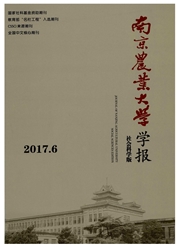

 中文摘要:
中文摘要:
基于中国特定汇率制度和农产品贸易TBT/SPS两个约束条件构建厂商农产品出口供给模型,结果表明,人民币汇率透过汇率水平变动和汇率波动性风险两个方面影响农产品出口,名义汇率水平上升(贬值)将促进农产品出口增长,汇率风险对于出口的影响却不明确,可能是正向、负向影响,或者无影响,具体结论依赖于厂商出口外汇收入与进口投入外汇支出成本的比较。因此,人民币汇率变动对农产品出口的影响取决于汇率水平变动和汇率风险二者影响的净效应。
 英文摘要:
英文摘要:
This paper constructs a model on agricultural export supply of the firm facing two constraints: China' s particular foreign exchange management system and serious technical barriers to trade (TBT) and sanitary and phytosanitary measures (SPS) in China's agricultural exports. The model shows that the export of agricultural products is influenced by both the exchange rate level change and the exchange rate volatility risk. The increase of nominal exchange rate level (devaluation) promotes the growth of China's agricultural export. The impact of exchange rate risk on export volume is not definite, may be positive, negative or none, depending on the comparison of manufacturer's foreign exchange revenue of export to its expenditure cost of imported inputs. Therefore, the trade effect of exchange rate movements relies on the net effect of changes of exchange rate level and exchange rate risk.
 同期刊论文项目
同期刊论文项目
 同项目期刊论文
同项目期刊论文
 期刊信息
期刊信息
